1335 Interview with Russell Thornton
INTERVIEW: Russell Thornton with The Ormsby Review
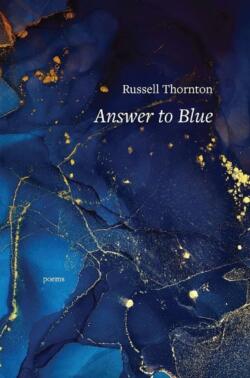 In “Greek Fire,” one of the poems in Russell Thornton’s astonishing new collection, the central image is of fire burning through water: “water is a bridge / for a fire to come into the world.” This image also illuminates the driving force that animates the poems in Answer to Blue (Harbour Publishing, 2021, reviewed here by Susan McCaslin — ed.). The stillness and quiet depth characteristic of Thornton’s poetry are here shot through with an irresistible vitality, a flame of mythic resonance.
In “Greek Fire,” one of the poems in Russell Thornton’s astonishing new collection, the central image is of fire burning through water: “water is a bridge / for a fire to come into the world.” This image also illuminates the driving force that animates the poems in Answer to Blue (Harbour Publishing, 2021, reviewed here by Susan McCaslin — ed.). The stillness and quiet depth characteristic of Thornton’s poetry are here shot through with an irresistible vitality, a flame of mythic resonance.
The past, both ancient and recent, exerts a gravitational pull throughout the collection, with Greek myths, family histories and biblical passages unearthed and examined, forgotten and returned to, giving way in a cyclical rhythm to the transient presence of young children and the death of a parent. With a clarity that pierces through the mist of daily routine, Thornton gives attention to transitional states, pausing at the often rushed-through moments of change, and also examines the phenomenon of perception itself.
Russell Thornton’s collection The Hundred Lives (2014) was shortlisted for the Griffin Poetry Prize. His Birds, Metals, Stones & Rain (2013) was shortlisted for the Governor General’s Literary Award for Poetry, the Raymond Souster Award, and the Dorothy Livesay Poetry Prize. His other titles include The Fifth Window, A Tunisian Notebook, House Built of Rain (shortlisted for the Dorothy Livesay Poetry Prize and the ReLit Award for poetry), and The Human Shore. After living for periods of time in Montreal, then in Aberystwyth, Wales, and then in Salonica, Greece, he has lived for the past number of years where he was born and grew up, in North Vancouver — Ed.
*
The Ormsby Review: The poem “Hinge” is an adventure in finesse. Did this poem always sound this way — it’s sparse and does what a great lyric poem should do — which is convey powerful feelings in an economy of words. Can you talk about this poem and what inspired it, what you were most excited about in its creation.
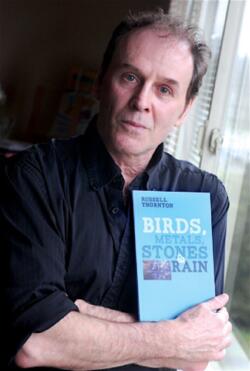
Russell Thornton: Often, I find I have an image or a phrase (or both) in my head that I feel must be the start of a poem; I go from there. With “Hinge” the image of a door hinge and the sound of the word hinge wouldn’t go away. I also had ideas about hinges that kept circulating in me. It seems to me an individual is a kind of door hinge on many levels — emotional, psychological, perceptual, metaphysical… I suppose I mean the “hinge” to be a metaphor for human consciousness. When I started blackening a notebook page or two, the lines came out shortish, clipped. My procedure is always to stick with what I’m “given” and try to be faithful to it and see what happens. The sparseness of this poem in terms of line length and accompanying overall sound and style asserted itself; I didn’t impose anything, really. I wrote the poem in a few minutes. Later, I made a few tiny adjustments in the language for neatness’ sake. I felt okay about the result. I thought I’d managed to be evocative about the condition of being a “hinge.” After I wrote the poem, I read Matt Rader’s book Visual Inspection. There’s a phrase in one of his pieces, “the door at the back of the eye.” It worked as a perfect prefatory quotation for my poem. It also helped me edit slightly the wording of the last three lines of my poem, where I was trying to end with a reference to imaginative vision.
The Ormsby Review: In this collection there are love poems alongside poems to people who you have passed away. Was this intentional?
Russell Thornton: When I was beginning to get serious about writing poems, a well-known older Canadian poet said to me, “There are only two subjects worth writing about, sex and death. And even when you think you’re writing about other things, that’s what you’re writing about.” At the time, I wondered if he was just being provocative, but now I feel he was right. I’d say that love, anyway, and death are for me the two ends of a tightrope. Poems are a kind of high-wire act. So, yes, it seemed appropriate to me to have poems in this book that are meant to be in the love and sex category (“Great with Tigers” for example) followed by poems about mortality (“My Mother’s Last Birthday Dinner” for example).
The Ormsby Review: Several of the poems in Answer to Blue are about your family members. Can you talk about your use of family as subject matter?
Russell Thornton: Aside from emotional necessity, I think the subject matter is instinct on my part, and maybe a response to what’s very much in the air these days. I mean, ideas of identity dominate the current cultural reality, not to mention Canadian poetry. For me, it’s extremely interesting and comes down to a bedrock wondering what it is to be a human being. I know I’ve asked myself, what, in the end, can be more bound up with a person’s truest, most elemental identity than that person’s family, including forbears. Often, any other questions and answers related to identity strike me as superficial — to do with what I’d say is fashion. One way I’ve always thought of poetry is as a refuge from fashion. Dylan Thomas’s poem for his father comes to mind (“Do Not Go Gentle into that Good Night”). Cesar Vallejo’s great, passionate pieces about his mother, father, and brothers come to mind. As do Sylvia Plath’s “Daddy” or “The Disquieting Muses.” What are a large proportion of the greatest stories ever set down all about? Family relationships, as far as I can see. Recently, I read something by the Canadian writer Tim Bowling, where he says, “What can be more natural or meaningful than exploring the very mystery of our blood and cells?” I take that to be a comment on, among other things, the power of family in literature; I agree with it.
The Ormsby Review: How has BC been for you personally or creatively during the last 2 years of the pandemic?
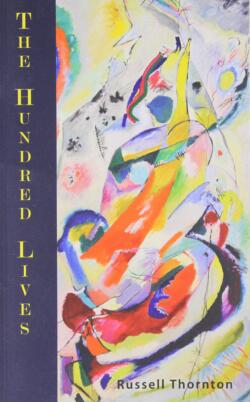
Russell Thornton: My mother had been staying with us (two adults and two young kids) in a two-bedroom apartment for the ten months before the pandemic hit. She was dying of cancer. So I had been in a stressful situation for a while when the pandemic hit. Then my mother died. Then I was taken up with two jobs, one of which I now did at home, and having kids at home sitting at my computer doing their grade 2 and 6 schoolwork via Microsoft Teams (or was it Zoom?). I had to keep my son from constantly typing snarky comments to his classmates. I’d see my daughter listening to music, writing stories, doing art, and texting friends while pretending to pay attention to her teacher delivering the day’s math lesson on the screen. The nice thing was that for a period there, the streets were empty, and my kids and I went on walks every evening. Other than that little blessing, the first year of the pandemic was a tense, wrenching time for me, as it was for many, many people. When my kids got back to in-person instruction, there were several cases of Covid at their school. My usual worrywart parental concern increased, that’s for sure. I had to make sure an elderly aunt of mine, who lives on her own and whom I see every day, stayed isolated. I watched as the isolation advanced her into dementia. On the “creative” front, not much changed for me except my writing locales. I used to go to public libraries to try to write for an hour or so a day on weekdays. I did whatever reading I wanted to do in my car in increments while waiting to drive my kids home from school and activities. When the libraries (and shopping mall food courts) closed, I did both reading and scribbling in my car. The more kid transportation I had to do, the better for me, as it turned out!
The Ormsby Review: If you were making a mixed poetry tape for a friend and could only put 4 poems on each side from your book, what would those eight poems be?
Russell Thornton:
Side 1:
Dumpster
Coyote
Debt
Drums
Side 2:
Foal
The Fine Print
Greek Fire
When the Whales Return
The Ormsby Review: Do dreams inform your work? Do you dream of poetry?
Russell Thornton: Yes. Your question immediately brings to mind some of my favourite lines of poetry (from Shakespeare’s The Tempest): “Sometimes a thousand twangling instruments / Will hum about mine ears; and sometime voices, / That, if I then had waked after long sleep, / Will make me sleep again: and then, in dreaming, / The clouds methought would open, and show riches / Ready to drop upon me; that, when I waked, /I cried to dream again.” For me, one way of talking about poems is to say they are waking dreams. I see dreams as potent poetic content in any case. The prime qualities of dreams — the symbolic changeableness, the playing-off of multiple perspectives — make me trust them, especially palpably deeper ones, as knowing more than my waking self knows, and having a certain authority. I’ve always been really interested in the relationship between waking consciousness and the unconscious, and between time and timelessness; I find myself thinking a lot about these divisions, these interfaces. Sometimes I feel a dream is a poem. All I need to do is remember the dream, record it in words that feel right, and the poem is complete for me. And yes, I dream of poetry. Like many people who write poems, often a line or two will come to me while I’m dreaming. Or I’ll dream the overall sound of a poem that I want to try to write. Once or twice, I’ve dreamt a fully formed poem — I mean dreamt all the words of the things. I’ve been able to remember the words the next day. I wish it would happen more often! It would make writing poems a lot easier!
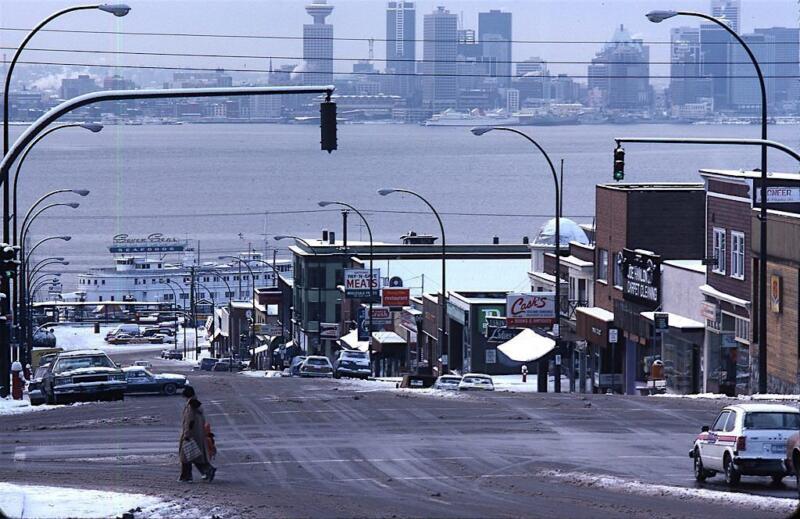
The Ormsby Review: Is there a behind the poem story about “Shore”? Was there a conversation in which you misheard / thought you heard someone say “silver beetles”? (I know the reference).
Russell Thornton: I was bike riding with my two kids, a girl and boy ages 9 and 5 at the time, and we found ourselves in the North Vancouver neighbourhood where I lived between the ages of 5 and 9 myself. I wanted to walk along the block that I hadn’t set foot on since I was taken away from the house where I’d experienced some trauma as a small kid. We got off our bikes in front of a house that I had run to a couple of times. There was a woman out front tending a little garden. When I complimented her on her work, she mentioned the challenges she’d had with silver beetles. I thought she was talking about The Silver Beetles — one of the early names of the group that became The Beatles. I was a big Beatles fan when I was quite young (I still am) and when we lived in a house on this block, my three younger brothers and I would imitate John, Paul, George, and Ringo and sing Fab Four songs. Of course, I realized a moment later that the woman was talking about an insect infestation. I was glad I’d misheard her. It brought back good memories of a time and place that I hadn’t been able to think about for a long time. It made me think about the mystery of an individual life, and memory and art.
The Ormsby Review: What was the first and last poem you wrote for Answer to Blue?
Russell Thornton: I always have a couple of manuscripts lying around, it seems, and often I take poems from this manuscript and put them in that one, and vice versa. I’m also not above making use of lines and bits and pieces of unpublished poems I wrote long ago. In Answer to Blue, I did in fact incorporate several lines into the poem “Blue” that I wrote when I was 18 or 19. Only core clusters of poems in each of my collections follow a chronological order of composition going from book to book. As far as complete poems go in Answer to Blue: If I checked my notebooks, I think I’d find I wrote the poem “Exit” around ten years ago. That one would be the “first.” I know I wrote the poem “When the Whales Return” in the spring of 2020. That one would be the “last.”
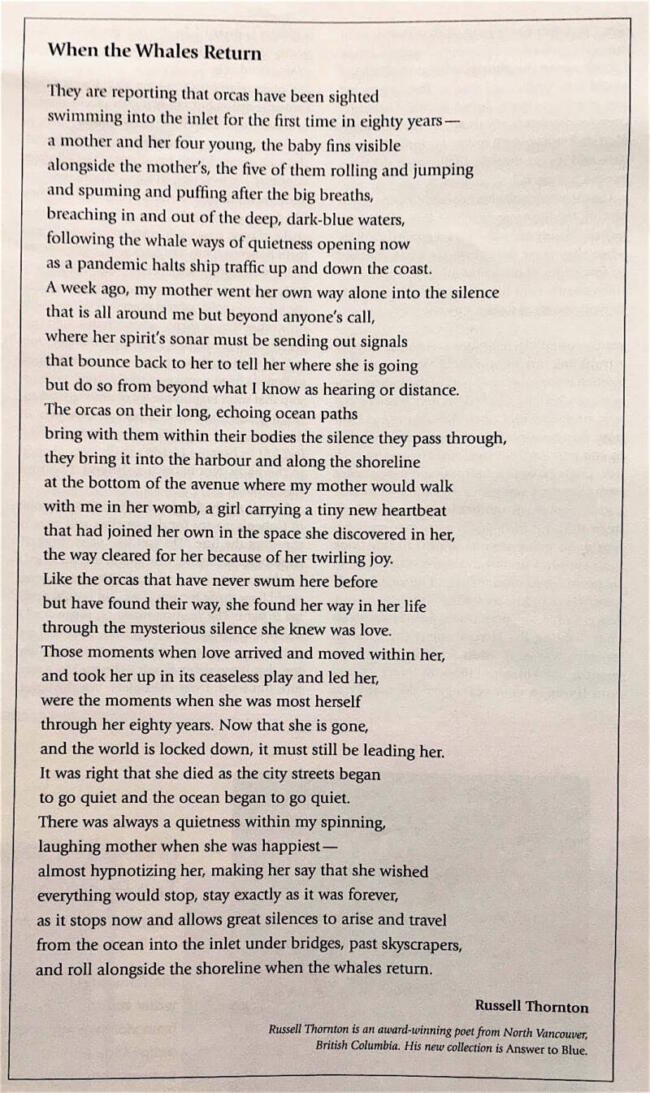
*
The Ormsby Review. More Books. More Reviews. More Often.
Publisher and Editor: Richard Mackie
The Ormsby Review is a journal service for in-depth coverage of BC books and authors in all fields and genres. The Advisory Board consists of Jean Barman, Wade Davis, Robin Fisher, Cole Harris, Hugh Johnston, Kathy Mezei, Patricia Roy, Maria Tippett, and Graeme Wynn. Scholarly Patron: SFU Graduate Liberal Studies. Honorary Patron: Yosef Wosk. Provincial Government Patron since September 2018: Creative BC
“Only connect.” – E.M. Forster